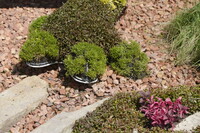Mosaicultures International Montreal 2013 [exhibit]
Mosaïcultures Internationales de Montréal

Download2A2-C-M-MIM-44_12_cp.jpg (719.8Kb)
Alternate file
Date
2014-12-23Description
Salamander According to Gaudi (entry from Barcelona, Spain); detail of salamander toes; The non-profit corporation Mosaïcultures Internationales de Montréal (MIM) was created in 1998 to organize the first edition of Mosaïcultures Internationales, held at the Parc des Éclusiers in Montreal’s Old Port in 2000. The 2013 "edition" was visited by over a million visitors during its run (June 22-September 29, 2013). The theme of the international exhibit, which featured over 200 horticultural artists, was "Land of Hope", highlighting ecological concerns. The exhibit is also a competition, held every 3 years. The 2013 edition had 50 entries from over 20 countries, and various Canadian cities with numerous sponsored prizes. The origin of mosaicultures traces back to the "embroidery bed" of 16th and 17th centuries. At the end of 1860s, the term "mosaiculture" was used for the first time at the Parc de la Tête d'Or in Lyon. In the beginning, gardeners created simple geometric patterns but over the years, mosaiculture has become more complex and has come to mean three-dimensional displays. Each sculpture is a living, sophisticated evolution of the traditional “stuffed topiary” technique. Thousands of meticulously groomed plants are planted into soil-and-sphagnum moss-filled netting covering the steel armature forms (hidden works of artisanship themselves) to carpet the skeletons in colorful forms and patterns. Complex irrigation systems beneath the surface of the sculptures allow the plants to grow. Source: Wikipedia; http://en.wikipedia.org/wiki/Main_Page (accessed 5/2/2014)
Type of Work
topiarySubject
botanical, contemporary (1960 to present), Gardens, horticultural art, temporary exhibits, international competitions, Twenty-first century
Rights
Rights Statement
Licensed for educational and research use by the MIT community only